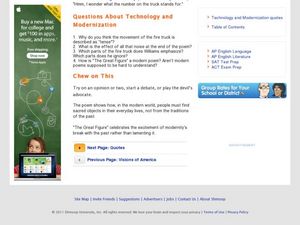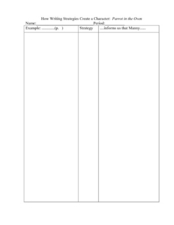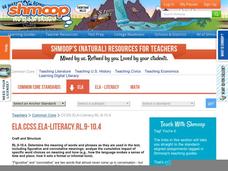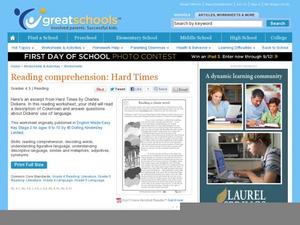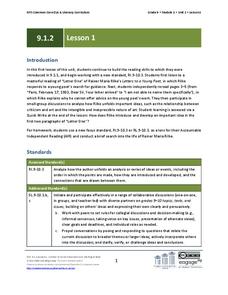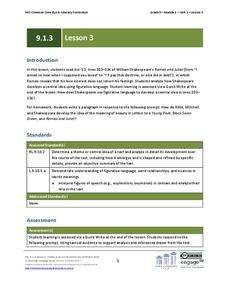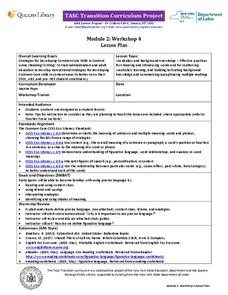Curated OER
Shakespeare's Othello and the Power of Language
High schoolers explore the basis of Iago's persuasive power by analyzing his astonishing command of rhetoric and figurative language. The diverse set of activities below include short group performances, writing exercises and the guided...
Curated OER
Personification
Second graders recognize personification in texts. In this personification lesson plan, 2nd graders discuss figurative language and how characters can be given human-like qualities. Students read a story and write down examples they...
Curated OER
"The Great Figure": Theme of Time
Click on and read the poem "The Great Figure" by William Carlos Williams, and then answer the four short answer and essay questions based on themes therein. A link to the summary and analysis questions is also included.
Curated OER
"The Great Figure": Theme of Technology and Modernization
Learners respond to four short answer and essay questions based on themes in the poem "The Great Figure" by William Carlos Williams. The poem itself is not included, but the questions could lead to some very interesting class discussions!
Curated OER
How Writing Strategies Create a Character: Parrot in the Oven
Identifying specific writing strategies while reading fiction helps to increase understanding of character development. This handout provides a template on which readers can record examples of figurative language and explain how it...
Curated OER
Linguistic Humor and Language Play
By George, there are so many literary devices illustrated here! Help your pupils create interest in their writing by presenting one or two of these literary devices at a time. The slides contain examples and beg participation from the...
Curated OER
Julius Caesar: Fun Trivia Quiz
This online interactive quiz tests reading comprehension and asks a few questions about figurative language in William Shakespeare's Julius Caesar.
Curated OER
I Have a Metaphor
Learners locate the literary devices used in Martin Luther King Jr.'s "I Have a Dream" speech. In this figurative language lesson plan, young scholars first distinguish between similes, metaphors, analogies, personification, etc....
Shmoop
ELA.CCSS.ELA-Literacy.RL.9-10.4
The fourth standard for reading literature in the Common Core calls for young readers to be able to determine the figurative and connotative meanings of words and phrases. Use this resource, a continuation of a series of Common Core...
Curated OER
Literary Terms
Seriously, 93 slides of literary terms? Yes, and well worth the time, although perhaps not all at once. The beauty here is in the concise, easy-to-understand definitions for such well-known terms as imagery and personification, as well...
E Reading Worksheets
Idioms Test
How well do your class members understand the figurative meaning of idioms? Find out with this 15 question multiple choice assessment.
Reed Novel Studies
The Great Gatsby: Novel Study
Some people believe that no matter how hard a man works, the American dream will always remain out of reach. A study guide for The Great Gatsby explores the themes, such as the illusory American dream, and elements of F. Scott...
Curated OER
Similes & Metaphors
Similes and metaphors are the focus of a 57-slide presentation that your class members should find engaging. Although your young scholars may find the musical selections dated, the color coding highlights the similes and metaphors found...
Curated OER
Reading a Classic Novel
Charles Dickens offers an excellent example of sensory writing in this reading comprehension worksheet. Learners read excerpts from the novel Hard Times in which he describes the New England industrial city of Coketown. They consider why...
Curated OER
Similes
Similes are a great way to get your writers thinking about descriptive details. They read a brief explanation which covers clichés and the general wording of a simile. Then, learners try a few on their own. First, they complete nine...
Carolina K-12
What Is the American Dream?
How do you describe the American Dream? What motivates others to immigrate to the United States, and why do some groups have trouble attaining the American Dream? Your learners will consider these questions as they explore figurative...
School District No. 71
Adding Written Detail: Using Jane Yolen’s Owl Moon as a Mentor Text
Access your senses with a worksheet on sensory language. Based on Owl Moon by Jane Yolen, the worksheet prompts kids to find examples of each of the five senses, as well as phrases for inner emotion.
EngageNY
Launching the Performance Task
This word or that, this picture or that. Individuals dive into the lives of The Little Rock Nine and the connotation used in the book A Mighty Long Way as they begin the performance task. The task scenario establishes literature lovers...
EngageNY
Grade 9 ELA Module 1, Unit 2, Lesson 1
Where does a writer find inspiration? "Go into yourself," says Rainer Maria Rilke in "Letter One" from Letters to a Young Poet. Readers of Rilke's letter to Franz Xaver Kappus examine the words and figurative language Rilke uses to...
EngageNY
Grade 9 ELA Module 1: Unit 3, Lesson 3
Class members listen to a masterful reading of Act 1, Scene 1, lines 203-236 of Romeo and Juliet and then break into groups to examine how Shakespeare uses figurative language to develop Romeo's idealized concept of beauty.
EngageNY
Grade 9 ELA Module 1: Unit 3, Lesson 5
Class members continue their study of Romeo and Juliet by watching scenes from Baz Luhrmann’s Romeo + Juliet and then examining the figurative language Shakespeare uses in Act 1, scene 5, lines 92–109 when Romeo and Juliet meet at the ball.
EngageNY
Analyzing an Author’s Craft: Carlotta’s Journey to Justice
Find your voice. Readers look at a passage from A Mighty Long Way and discuss what it means for Carlotta to find her voice. After discussing figurative language and idioms, learners listen to the song "This Little Light of Mine" and...
New York State Education Department
TASC Transition Curriculum: Workshop 4
Why is it important to use precise language? Participants explore this question in the fourth activity in a series of 15 on effective instruction. Perfect for all content areas, the activity promotes appropriate language choice through...
Curated OER
The Body Talks
Young historians examine the gestures of human subjects represented in Mannerist, Baroque and Renaissance paintings. After they play charades and attempt to match dialogue with body language, learners create a drawing that includes...
Other popular searches
- Figurative Language Poetry
- Figurative Language in Poems
- Figurative Language Quiz
- Figurative Language Project
- Imagery Figurative Language
- Figurative Language Lessons
- Using Figurative Language
- Figurative Language Worksheets
- Figurative Language Test
- Figurative Language in Poetry
- Figurative Language Vocabulary
- Figurative Language in Prose





